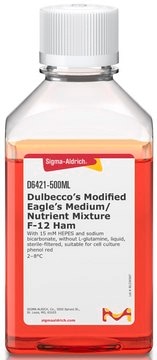D6434
DMEM/F-12
With HEPES, sodium bicarbonate and sodium pyruvate, without ʟ-glutamine and phenol red, sterile liquid, suitable for cell culture
Synonym(s):
DME/Nutrient Mixture F-12 Ham, DMEM Hams F12, DME/F-12, 1:1 mixture
About This Item
Recommended Products
product name
Dulbecco′s Modified Eagle′s Medium/Nutrient Mixture F-12 Ham, With 15 mM HEPES and sodium bicarbonate, without L-glutamine and phenol red, liquid, sterile-filtered, suitable for cell culture
Quality Level
sterility
sterile-filtered
form
liquid
technique(s)
cell culture | mammalian: suitable
impurities
endotoxin, tested
components
L-glutamine: no
phenol red: no
NaHCO3: yes
HEPES: 15 mM
sodium pyruvate: 0.055 g/L
glucose: 3.15 g/L
shipped in
ambient
storage temp.
2-8°C
Looking for similar products? Visit Product Comparison Guide
Related Categories
General description
Application
- bovine endometrial epithelial cells
- cancer stem cells
- breast cancer cell line
Reconstitution
also commonly purchased with this product
supplement
signalword
Warning
hcodes
Hazard Classifications
Skin Sens. 1
wgk_germany
WGK 3
flash_point_f
Not applicable
flash_point_c
Not applicable
Certificates of Analysis (COA)
Search for Certificates of Analysis (COA) by entering the products Lot/Batch Number. Lot and Batch Numbers can be found on a product’s label following the words ‘Lot’ or ‘Batch’.
Already Own This Product?
Find documentation for the products that you have recently purchased in the Document Library.
Customers Also Viewed
Our team of scientists has experience in all areas of research including Life Science, Material Science, Chemical Synthesis, Chromatography, Analytical and many others.
Contact Technical Service




